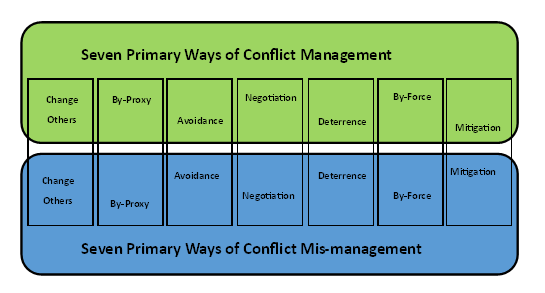There are seven primary ways of Conflict Management. They are Change Others, By-Proxy, Avoidance, Negotiation, Deterrence, By-Force, and Mitigation.
There are seven primary ways of Conflict Mis-management. They are Change Others, By-Proxy, Avoidance, Negotiation, Deterrence, By-Force, and Mitigation.
Yes, the methods of conflict management can also be the methods of conflict mis-management and vice-versa. What works in one situation, may not work in another. In fact, it may make the situation worse. For example, the By-Force punch to the face may cause the end of a conflict or it may cause the next stage of an escalated conflict. The situation dictates.
Does that mean you have a one in seven chance of selecting a way that works during a conflict? No, it doesn’t. Depending upon how you look it at, those seven primary ways can be combined and ordered to form dozens of useful secondary ways. First example, Avoidance –> Negotiation -> By-Force is different from Deterrence -> By-Force–> Mitigation which is different from Change Others -> By-Proxy.
The timing of the specific way(s) used is important. The “right” way used at the “wrong” time results in conflict mis-management. The magnitude of the way executed is also critical for differentiating between successful management and unsuccessful mis-management. Too little or too much of the way(s) will result in mis-management. An appropriate level of the way(s) is needed to create conflict management. Think Goldilocks here.
Does that mean you have a one in a few dozen chance of selecting a way that works? No. There are many ways in which a conflict can be managed. And many ways that will led to conflict mis-management. Think of it as a maze with many routes that lead to the exit and many routes that led to dead ends. Some routes may be more efficient than others in getting you to the exit. Some routes will bring you to the dead end faster. Some will get you close to the exit, but force you to turn around.
To summarize, there are lots of ways to manage a conflict. There are lots of ways to mis-manage a conflict. But those many ways originate from the seven primary ways. Think of them as the primary colors that combine to create many other colors of various shades and hues.
In order to increase the likelihood of managing a conflict, you need to choose one of the ways that is most likely to work and not choose one of the ways that is most likely to not work.
What you are dealing with is probabilities, not certainties. There is no guarantee that any one way will work or that anyone way will not work. But they are ways that have a higher or lower probability of working in any given situation.
For example, assume that using Negotiation works 80% of the time. But there are those 20% of the situations where verbal negotiation will not be enough. In fact, in a few of those 20%, negotiating may be the worst thing you could do (dealing with Process Predator for instance). The use of By-Force may work for you the majority of the time, but when it fails, you may end up dead or seriously injured.
Therefore, in order to create a high probability of managing conflict, you must have an understanding of the multiple ways that have a high probability of working in certain types of conflicts. And also have an understanding of the multiple ways that have a high probability of not working in certain types of conflict.
For example, calling someone an “asshole” has a low probability of working and a high probability of not working most of the time in most situations. But there are situations where that type of verbal utterance is just what is needed to stop someone’s bad behavior.
The bottom line is that if you are unfamiliar with the seven primary ways of dealing with a conflict, you are more likely to be engaging in conflict mis-management and less likely to be engaging in conflict management. And if you are thinking of conflicts in in terms of certainties not probabilities, you are highly likely to be engaging in conflict mis-management.
